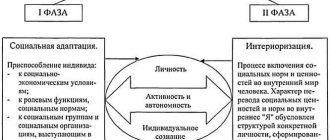The concept of personality finds its definition in many areas of life and sciences; even every person who does not have academic knowledge can formulate his own designation for this concept. But still, in order to correctly use any term, it is necessary to understand its meaning. The scientific definition looks like this: personality is a reflection of the volitional nature of a person, its social and personal roles, a stable system of certain human characteristics, expressed primarily in the social sphere of life. In popular speech, the definition can be formulated as follows: a person is a person who has a set of strong and persistent qualities, knows how to use them to achieve goals, is self-confident, knows how to use the experience gained, is able to control life and be responsible for his actions to society , and his actions always correspond to his words.
You can often hear that the concept of individual personality and individuality is used in the same context, since many consider them identical. In fact, this is not so, and you need to figure out what the difference is.
An individual is a representative of the human race, a unit of humanity. That is, a person who has not yet grown up and has not begun to socialize and try on any social roles and masks.
The concept of an individual and a personality are different to the extent that an individual may never become a person.
Individuality is a unique system of psychological characterological characteristics of a person (temperament, communication style, leading character traits, abilities, specificity of mental processes), which defines him as a unique person with a unique style of behavior. That is, those qualities that distinguish one person from another.
The concepts of personality and individuality are a little close, because both reflect a system of qualities, but only in a person these qualities are more persistent and speak less about its uniqueness than about the strength of character.
The concept of individual personality individuality has different meanings, but, in essence, they all make up the structure of a person.
The concepts of man, individual and personality are related as follows: a person is first born as an individual, then learning about the world and people, and having learned to perceive society, he acquires individuality, that is, he has already developed certain patterns of behavior. When a person grows up further, different situations and incidents happen to him and he begins to learn how to cope with them, look for ways to solve problems, control emotions and take responsibility for actions, having gone through all this, a person becomes an individual.
All people develop their personality at different ages. Some people, even at 45 years old, cannot be responsible for their actions, act consciously and independently, especially when someone is overly protective of them. They are afraid to leave their comfort zone. There is no need to rely on such a person in a serious matter. You can often hear from them “yes, I will definitely do this, I’ll even start today.” But neither tomorrow, nor even in a month they will do what they promised. Very often these people are lazy, cowardly, they may have either low self-esteem or high self-esteem.
It happens that a person becomes a person before he even leaves childhood. Basically, children deprived of care, who are left to the mercy of fate and have to survive, quickly become individuals, and for this they need to have a strong character and an iron will.
Here the concepts of personality and individuality intersect, because a person, having strongly expressed unique character traits acquired in the process of the problem of a dysfunctional childhood, quickly becomes a person, thereby strengthening these traits. It also happens when there are several children in a family, then the eldest child will also be distinguished by strong-willed, persistent qualities of character.
Definition of the concept
Since the phenomenon of personality is a subject of study not only in psychology, but also in other humanities, the term does not have an unambiguous definition. For a better understanding of what a person is, three main definitions will be given below.
Personality is a set of individual qualities of a person (thinking, will, and so on) that determine his behavior in society, speak about his values, life experience, and aspirations.
In other words, the psychological difference between one individual and another characterizes his personality.
A person can be defined as a subject of society with a set of roles (social and personal), certain habits and experiences.
This term also refers to a person who is completely responsible for all aspects of his life.
Personality structure
To better understand the term, it is worth considering its structure.
The structure of personality can be understood as the interaction of its component parts (character, aspirations, will, abilities, emotions). These parts (components) characterize a person; they can be called her traits. To structure these personality-defining traits, the following levels are distinguished:
- lower,
- second,
- third,
- higher.
The lowest level is the mental characteristics of a person determined by gender, age, and innate qualities.
The second level involves individual characteristics depending on innate qualities and their development (memory, thinking, abilities, perception of the surrounding world).
The third level is formed throughout life and is associated with socialization. It defines individual experience (knowledge acquired throughout life, habits, skills).
The highest level reflects the worldview, inclinations, beliefs, character traits, the so-called personality orientation. The highest level is most dependent on the social environment in which the formation of personality occurs. Education has a strong influence on the formation of this level. This structure gives a generalized idea of personality. Each person is multifaceted and the differences between people at each level of the structure discussed above are determined by individual experience, beliefs, character, and knowledge. This versatility and individuality often becomes the reason why it is difficult to understand an opponent and avoid conflict situations.
To better understand others and yourself, you need to have an idea of personality characteristics, be aware and observant.
Afterword
Despite the fact that most scientists are of the opinion that individuals are made and not born, the question of whether all people are individuals continues to attract controversy and controversial opinions.
- The question of whether a child can be considered a person is controversial, although humanistic pedagogy argues that, undoubtedly, it can and should be.
- The understanding of a mentally ill person or a criminal as an individual is just as controversial.
- Don’t the phrases “asocial personality” or “degraded personality” look ridiculous?
In the end, everyone chooses for themselves which side they belong to in these issues. In my opinion, each person (especially important for young children when raising) can be treated as a potential personality, that is, given a few points head start. However, this is possible until a person proves otherwise.
Main characteristics
In psychology, personality characteristics are understood as those mental phenomena through which an individual manifests himself in communication with others and in everyday activities. The following main personality characteristics are distinguished:
- capabilities,
- will,
- temperament,
- character,
- emotions,
- motivation.
Capabilities
When it comes to a person’s successes and achievements (for example, studying at school), abilities are considered to be the criterion for assessing this success.
Abilities can be called properties of the soul, uniting all mental processes and states of a person. They also mean the totality of all the skills of an individual, thanks to which he successfully performs certain actions. Simply put, ability is both the ability to do something well, for example, to draw, and to experience strong feelings, for example, love or compassion.
Abilities are divided into:
- complex and simple
- practical and theoretical,
- educational and creative,
- general and special,
- communicative and subject-active.
Complex and simple abilities
The simplest include innate abilities based on the activity of the senses and elementary motor activity. For example, the ability to distinguish colors, sounds, walk, sit, and so on.
Complex abilities are understood as skills related to human culture (painting pictures, the ability to solve difficult problems in physics, etc.). These are not innate abilities; they are socially conditioned.
Practical and theoretical abilities
Practical abilities are understood as the ability of an individual to pose and solve problems that require action in certain situations.
Theoretical abilities determine abstract and logical thinking, the ability to solve theoretical problems.
Academic and creative abilities
Learning abilities mean how well a person learns new things, acquires knowledge, and acquires skills.
Creative abilities determine an individual’s ability to generate new ideas and produce spiritual and material values.
General and special abilities
General abilities are understood as those abilities that every person has (general mental, motor). But they are developed differently for everyone. And success in certain areas depends on this.
Special abilities can be defined as specific abilities that not every individual has. As a rule, they require innate abilities. This could be musical, acting or literary abilities.
Will
Will is what allows an individual to control his actions and psyche. This is conscious control over one’s behavior, a conscious influence on the surrounding reality.
The following factors can be called signs of will:
- making informed decisions,
- achieving your goals, overcoming difficulties on the way to them,
- self-restraint, when in order to achieve a goal an individual deprives himself of something that may seem attractive to him,
- a clear action plan,
- lack of emotional satisfaction from solving the task,
- moral satisfaction associated with achieving and overcoming oneself.
Will is a person’s main assistant in achieving his goals, the quality that helps him develop and grow as a person. It is the will that helps a person overcome life’s difficulties, even when it seems that the goal is unattainable.
Types
There are several main personality types:
- Socialized - which are adapted to the conditions of social life.
- Desocialized - who deviate from the requirements of society. These include marginalized individuals. The problem of the individual in this case is non-acceptance by society.
- Mentally abnormal are persons who have some delays in mental development, psychopaths. Here the personality problem is that people try to avoid such persons.
A socialized normal entity has a number of features. She has autonomy, assertion of her own individuality. If critical situations arise, the socialized nature retains its strategy and does not change its life principles and positions. If extreme situations and psychological breakdowns arise, such a nature can prevent the consequences by reassessing values. The concept of such a personality involves maintaining an optimal mood in any situation.
If an individual is mentally balanced, then he builds friendly relationships with other people and is altruistic in relation to their needs. When constructing life plans, a normal nature proceeds from reality and has a sense of honor and justice. She is persistent in achieving her goals and can easily adjust her own behavior. The sources of success or failure for her are herself, and not external circumstances.
If difficult situations arise, a well-developed individual is able to take responsibility and take reasonable risks. So, the human essence is something that has a consciousness of its own isolation, which allows it to be free from the dictates of power and remain calm under any conditions. Such personality abilities make it strong and contribute to further development. The core is spirituality, which is represented by the highest manifestation of human essence, commitment to morality.
Temperament
Temperament is those properties of the psyche that are responsible for its processes and human states.
The following main types of temperament, defined by Hippocrates, are distinguished:
- melancholic,
- choleric,
- phlegmatic,
- sanguine.
A melancholic person is characterized by a tense inner life. People with this temperament are usually gloomy, vulnerable, and have a high level of anxiety. They are restrained in communication, get tired quickly, and give in to difficulties.
Cholerics are quick-tempered, impulsive people, persistent. They have difficulty restraining their emotions, but quickly calm down if they get their way. Such people are true to their interests and aspirations.
Phlegmatic people are efficient and patient, they know how to control themselves perfectly. These are cold-blooded people who are difficult to disturb, but if this happens, it is difficult for them to calm down. Those with a phlegmatic temperament have difficulty adapting to new things and do not easily get rid of old habits.
Sanguine people are cheerful, optimistic, sociable people who love to joke. They are open to new things and easily adapt to changes, they are disciplined in their work and are able to keep their emotions in check.
This is a general and incomplete classification that gives general ideas about temperament.
You need to understand that a person can combine traits of different temperaments and that these types are not often found in their pure form.
Character
In psychology, character is understood as the way a person interacts with other people and the world. It is formed depending on the social conditions in which the individual is located and raised.
Character is manifested in the reaction to the actions of other people, in the manners of the person himself. Many character traits can be grouped into three groups:
- strong-willed,
- business,
- communicative,
- motivational,
- instrumental.
As it is not difficult to guess, strong-willed character traits determine a person’s will and its accompanying qualities (perseverance, determination, compliance).
Business traits are how an individual behaves during work (conscientiousness, laziness, responsibility, tendency to procrastinate).
Communication traits determine how contactable and sociable a person is, how he communicates with others (openness, kindness, politeness, rudeness, isolation).
Motivational traits mean those qualities that encourage action, directing it. Instrumental traits give a certain style to human behavior.
Emotions
Emotions in psychology are defined as individual experiences that arise when vital needs are satisfied (dissatisfied). They may be pleasant or not.
A person is capable of experiencing a variety of emotions, but the main ones include the following:
- the simplest emotions
- mood,
- affects,
- feelings.
The simplest emotions, their manifestation, are associated with the satisfaction of physiological needs.
Mood is a set of emotions that can describe the state of an individual at a certain moment.
Affects can be called strong short-term emotions that have...
By feelings, psychologists understand an individual’s experiences caused by a certain object.
Emotionally, people are very different from each other. These differences consist of different intensity and direction, and the duration of the experience of emotions.
Emotions influence decision-making and specific actions. This is why it is important to control your feelings.
The individual as a representative of the human species
The human community is made up of individuals. That is, we can use this word to call any representative of Homo sapiens, regardless of age, race, level of mental development, state of health or position in society.
In relation to a representative of an animal community, the concept “individual” is usually used. Sometimes a person is called that, but in this case this term sounds with a tinge of disdain, or even as an outright insult.
So, an individual is a representative of people as biological beings, and his characteristics also have a biological nature. These include the following:
- genotype – a set of innate characteristics of genes that creates conditions for the unique development of an organism;
- phenotype - a set of characteristics of an organism that are the result of the interaction of the genotype with the environment;
- the integrity of the biological and physiological structure of the body and its resistance to environmental influences.
By the way, the difference between an individual (human) and an individual (animal) lies precisely in biological - genotypic and phenotypic characteristics. Neither speech, nor consciousness, nor work activity or upright posture are characteristics of an individual. Although they are unique to humans, they are not biologically given, but are formed in the process of human development under the influence of society.
Therefore, we can include in the category of “individual” newborn babies who cannot speak or walk, and mentally disabled, and deaf-mute, and even those in a coma. A person is born an individual and remains one until death, regardless of the conditions of existence.











